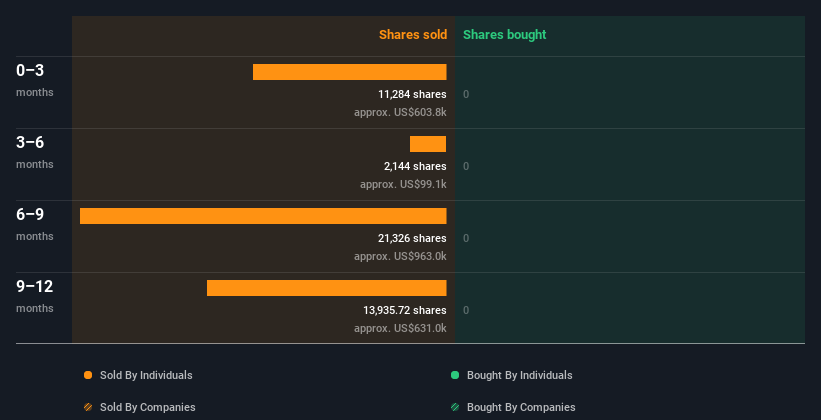
Anyone interested in Hancock Whitney Corporation (NASDAQ:HWC) should probably be aware that the Senior EVP, Michael Achary, recently divested US$443k worth of shares in the company, at an average price of US$52.55 each. The eyebrow raising move amounted to a reduction of 13% in their holding.
View our latest analysis for Hancock Whitney
The Last 12 Months Of Insider Transactions At Hancock Whitney
The Senior EVP & COO, D. Loper, made the biggest insider sale in the last 12 months. That single transaction was for US$828k worth of shares at a price of US$46.81 each. That means that an insider was selling shares at slightly below the current price (US$51.78). We generally consider it a negative if insiders have been selling, especially if they did so below the current price, because it implies that they considered a lower price to be reasonable. However, while insider selling is sometimes discouraging, it's only a weak signal. This single sale was just 20% of D. Loper's stake.
Hancock Whitney insiders didn't buy any shares over the last year. You can see the insider transactions (by companies and individuals) over the last year depicted in the chart below. By clicking on the graph below, you can see the precise details of each insider transaction!

For those who like to find hidden gems this free list of small cap companies with recent insider purchasing, could be just the ticket.
Does Hancock Whitney Boast High Insider Ownership?
Many investors like to check how much of a company is owned by insiders. A high insider ownership often makes company leadership more mindful of shareholder interests. Insiders own 0.9% of Hancock Whitney shares, worth about US$39m. While this is a strong but not outstanding level of insider ownership, it's enough to indicate some alignment between management and smaller shareholders.
So What Does This Data Suggest About Hancock Whitney Insiders?
Insiders sold stock recently, but they haven't been buying. And even if we look at the last year, we didn't see any purchases. Insider ownership isn't particularly high, so this analysis makes us cautious about the company. We'd practice some caution before buying! So while it's helpful to know what insiders are doing in terms of buying or selling, it's also helpful to know the risks that a particular company is facing. Every company has risks, and we've spotted 1 warning sign for Hancock Whitney you should know about.
But note: Hancock Whitney may not be the best stock to buy. So take a peek at this free list of interesting companies with high ROE and low debt.
For the purposes of this article, insiders are those individuals who report their transactions to the relevant regulatory body. We currently account for open market transactions and private dispositions of direct interests only, but not derivative transactions or indirect interests.
Valuation is complex, but we're here to simplify it.
Discover if Hancock Whitney might be undervalued or overvalued with our detailed analysis, featuring fair value estimates, potential risks, dividends, insider trades, and its financial condition.
Access Free AnalysisHave feedback on this article? Concerned about the content? Get in touch with us directly. Alternatively, email editorial-team (at) simplywallst.com.
This article by Simply Wall St is general in nature. We provide commentary based on historical data and analyst forecasts only using an unbiased methodology and our articles are not intended to be financial advice. It does not constitute a recommendation to buy or sell any stock, and does not take account of your objectives, or your financial situation. We aim to bring you long-term focused analysis driven by fundamental data. Note that our analysis may not factor in the latest price-sensitive company announcements or qualitative material. Simply Wall St has no position in any stocks mentioned.
About NasdaqGS:HWC
Hancock Whitney
Operates as the financial holding company for Hancock Whitney Bank that provides traditional and online banking services to commercial, small business, and retail customers.
Flawless balance sheet established dividend payer.


